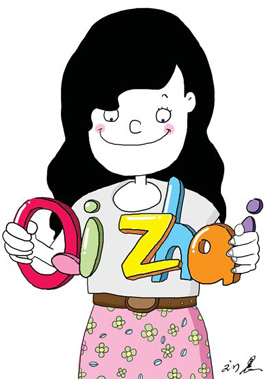Comment
Proud of being a Chinese
By Qi Zhai (China Daily)
Updated: 2009-12-25 10:50
 |
Large Medium Small |
For 20 years, I lived in Anglophone countries as "Zhai Qi" or "Qi Zhai". I love the simplicity of my two-syllable name, with its alphabetic gaggle, because it identifies me as uniquely Chinese. However, on some occasions - like during client meetings in Ohio - I did feel things would have been a lot easier if I had an English moniker.

Yet, "Mary" or "Samantha" never felt right, so I stuck with the only name I know. At times, it was a struggle: "Q-I, like IQ spelled backwards." "No, my parents didn't name me 'seven', 'taichi', or 'gas.' There are a lot of homonyms in Chinese."
"Think of the 'Zh' as a 'J'."
But I struggled along, putting up with people calling me "Kwee", "Key", "Kai", "Xhai" by mistake. I was relieved to come back to Beijing. Finally, my name would not give me any more trouble.
I was wrong. Every week that I have been back someone has asked me to wisely consider giving myself an English name. Really? What's going on here?
I pondered my predicament and can only explain it as some kind of inferiority complex that we Chinese can't seem to shake. While Western media may report on fierce displays of nationalism in China, here on the ground I feel an overwhelming Chinese admiration for all things foreign.
My Chinese name and I first ran into "reverse discrimination" at an English learning center, where I was hoping to tutor students as a meaningful way to spend my break from corporate life. After examining copies of my diplomas from a top American university, listening to my Californian accent, and verifying my most recent employment at a global investment bank, the staffer smilingly told me, "Everything looks great! Just let me know what English name you decide on and we can start assigning you students."

Seeing my surprise, she explained, "No Chinese parent would pay for their child to take English lessons from a girl named 'Qi.'"
After I left the center, I started noticing this Chinese self-disdain everywhere. In boutiques, salesgirls unabashedly praised me as "yangqi" (literally "Western aura") when I tried on apparel. Every sweater I fingered was proclaimed to be a Korean import, a Japanese design, or an exclusive export on its way to Scandinavia.
Maybe salespeople are just desperate for a buck. I shouldn't hold them responsible for starting the national obsession with foreignness. Yet, I felt the same attitude in other contexts. As I started meeting people, they would prematurely conclude that I: 1) was born overseas and 2) have long converted my Chinese passport to a "better" one.
I patiently explain that I'm Chinese, from the modest outskirts of Harbin, still proudly carry my crimson passport, and speak English because I lived overseas. Inside, I'm dying to shout in exasperation, "Let's have some pride in ourselves, people! Is being Chinese that bad?"
For all our faulty manufacturing and other imperfections, there are still plenty of good reasons to be proud of being Chinese. Please don't make me start with, "We have a five thousand year tradition of"
On a recent trip to Japan, I saw an entirely different mentality. There, people buy domestic goods and "imported" is not a good thing. The Japanese keep their best ideas at home, exporting only the stuff that isn't up to par (case in point, the VCD).
We don't necessarily need a superiority complex, but we could certainly embrace "Made in China" with a little more pride, starting with our own names.
qriouslife@gmail.com









